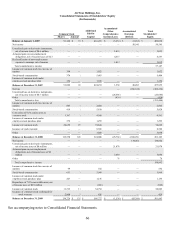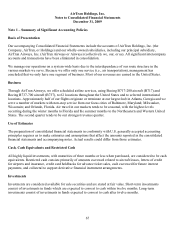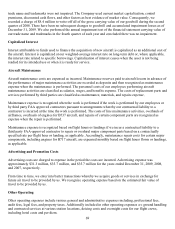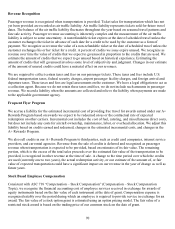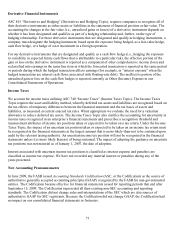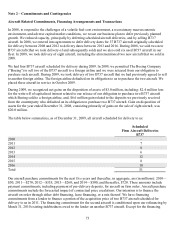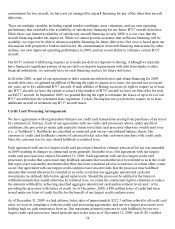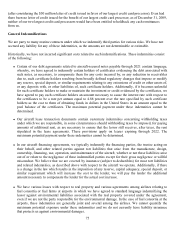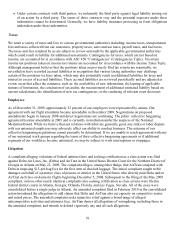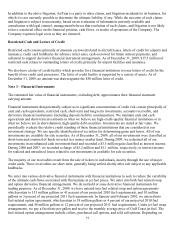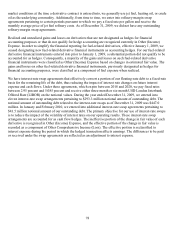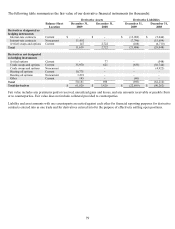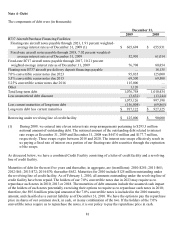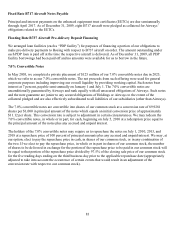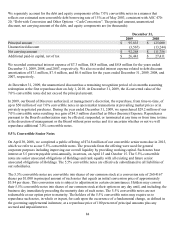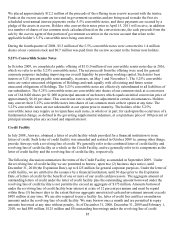Airtran 2009 Annual Report Download - page 85
Download and view the complete annual report
Please find page 85 of the 2009 Airtran annual report below. You can navigate through the pages in the report by either clicking on the pages listed below, or by using the keyword search tool below to find specific information within the annual report.76
xUnder certain contracts with third parties, we indemnify the third party against legal liability arising ou
t
of an action by a third party. The terms of these contracts vary and the potential exposure under these
indemnities cannot be determined. Generally, we have liability insurance protecting us from obligations
undertaken under these indemnities.
Taxes
We remit a variety of taxes and fees to various governmental authorities including: income taxes, transportation
fees and taxes collected from our customers, property taxes, sales and use taxes, payroll taxes, and fuel taxes.
The taxes and fees remitted by us are subject to review and audit by the applicable governmental authorities
which could result in liability for additional assessments. Contingencies for taxes, which are not based on
income, are accounted for in accordance with ASC 450 “Contingencies” (Contingencies Topic). Uncertain
income tax positions taken on income tax returns are accounted for in accordance with the Income Taxes Topic.
Although management believes that the positions taken on previously filed tax returns are reasonable, we
nevertheless have recorded accrued liabilities in recognition that various taxing authorities may challenge
certain of the positions we have taken, which may also potentially result in additional liabilities for taxes and
interest in excess of accrued liabilities. These accrued liabilities are reviewed periodically and are adjusted as
events occur that affect the estimates, such as: the availability of new information, the lapsing of applicable
statutes of limitations, the conclusion of tax audits, the measurement of additional estimated liability based on
current calculations, the identification of new tax contingencies, or the rendering of relevant court decisions.
Employees
As of December 31, 2009, approximately 52 percent of our employees were represented by unions. Our
agreement with our flight attendants became amendable in December 2008. Negotiations on proposed
amendments began in January 2008 and direct negotiations are continuing. The pilots’ collective bargaining
agreement became amendable in 2005 and is currently in mediation under the auspices of the National
Mediation Board. While we believe that our relations with labor are generally good, any strike or labor dispute
with our unionized employees may adversely affect our ability to conduct business. The outcome of our
collective bargaining negotiations cannot presently be determined. If we are unable to reach agreement with any
of our unionized work groups regarding the terms of their collective bargaining agreements or if additional
segments of our workforce become unionized, we may be subject to work interruptions or stoppages.
Litigation
A complaint alleging violations of federal antitrust laws and seeking certification as a class action was filed
against Delta Air Lines, Inc. (Delta) and AirTran in the United States District Court for the Northern District of
Georgia in Atlanta on May 22, 2009. The complaint alleges, among other things, that AirTran conspired with
Delta in imposing $15-per-bag fees for the first item of checked luggage. The initial complaint sought treble
damages on behalf of a putative class of persons or entities in the United States who directly paid Delta and/or
AirTran such fees on domestic flights beginning December 5, 2008. Subsequent to the filing of the May 2009
complaint, various other nearly identical complaints also seeking certification as class actions were filed in
federal district courts in Atlanta, Georgia; Orlando, Florida; and Las Vegas, Nevada. All of the cases were
consolidated before a single judge in Atlanta. An amended complaint filed in February 2010 in the consolidated
action broadened the allegations to add claims that Delta and AirTran also cut capacity on competitive routes
and raised prices. The amended complaint seeks injunctive relief against a broad range of alleged
anticompetitive activities and attorneys fees. AirTran denies all allegations of wrongdoing, including those in
the amended complaint, and intends to defend vigorously any and all such allegations.


